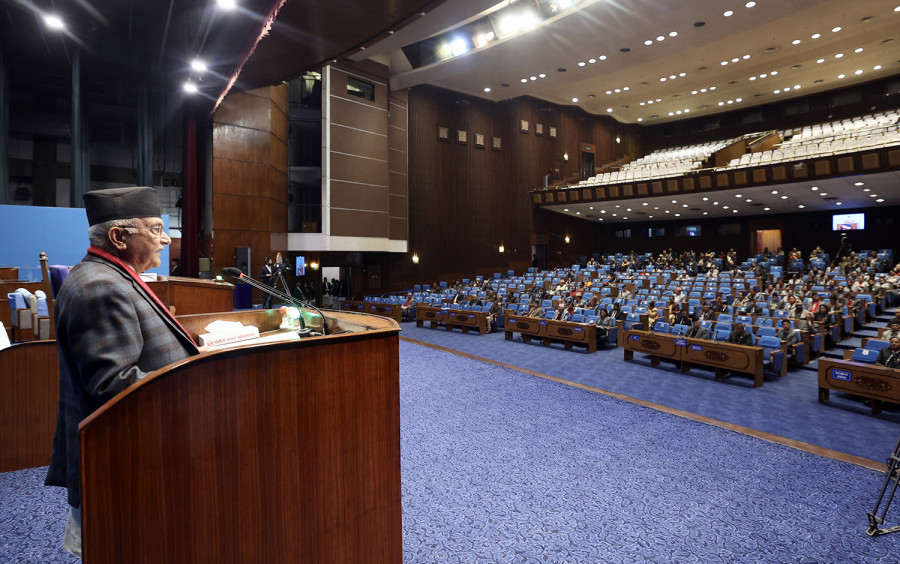National
Oli and Lamichhane make disparaging remarks against the court
Experts say casting aspersions on court verdicts weakens the country’s democratic fabric.
Purushottam Poudel
The castigating remarks by CPN-UML chair KP Sharma Oli against the court during his address in Parliament on Sunday, as well as criticism of the court by Rabi Lamichhane, president of the Rastriya Swatantra Party, at the press conference organised to announce his party's exit from the government later in the day, are attempts at weakening a key pillar of democracy, say experts.
“Their attitude is one of apathy towards the democratic system,” Bipin Adhikari, a constitutional expert, told the Post. “The manner in which the court is being attacked in public is unacceptable. The UML chair appears to be intolerant of the independent decision made by the court. It is also an issue of contempt of court.”
Nepali Congress leader Shekhar Koirala also objected to the comments made by UML chair Oli on the judicial system and RSP President Lamichhane on the media sector.
“Independent judiciary is a pillar of democracy. Threats and unnecessary comments directed at the institutions will not be tolerated by the Congress,” said Koirala, addressing a party programme in Chitwan on Monday.
The UML chair has time and again questioned the accountability and credibility of the country’s judicial system.
Lately, while addressing Parliament on Sunday, Oli questioned Nepal’s judicial system, claiming that the court’s verdict against the RSP President Lamichhane has helped no one.
“I was surprised to hear the decision on Rabi Lamichhane’s citizenship dispute,” said Oli, sympathising with Lamichhane. “Who got justice from the Supreme Court’s decision and who did the court give justice to?”
Oli also claimed that Lamichhane did not work against the state or violate the law. “If his citizenship had caused harm to the state or had violated the law, legal action should have been taken. However, according to the court's decision, Lamichhane's citizenship was revoked on Friday (January 27) and then he was granted his citizenship on Sunday.”
Oli further questioned the Constitutional Bench’s ruling, saying, “What is the significance and worth of the court's decision?”
Not only on Sunday, Oli had condemned the judiciary previously too. The Supreme Court had twice reinstalled the House of Representatives in 2021 when Oli had tried to dissolve it. Since then, Oli has been spewing venom at the judiciary.
Why has Oli, the former prime minister, repeatedly been demonising the court’s decisions? UML leaders have their own interpretations.
“There is ample room to question a court which gave a mandamus order to form a government,” UML deputy general secretary Prithvi Subba Gurung told the Post.
“In a parliamentary system, the prime minister is appointed by Parliament, but our court ordered that a specific person be made the prime minister. Why should we not question the judicial system then?”
The Supreme Court had twice overruled the Oli government's decision to dissolve the House of Representatives and directed officials to call a meeting of Parliament.
The Supreme Court ordered President Bidya Devi Bhandari to install a new government led by Nepali Congress President Sher Bahadur Deuba under Article 76 (5) of the constitution after again rejecting the Oli administration's intent to dismiss the legislature.
Lamichhane, the RSP president, at the Sunday press meet, questioned the top court: “When there are plenty of issues pending in the court, why was my case given preference?”
Lamichhane also accused the media of aiding his expulsion from the government by constantly reporting on his citizenship, which prompted the court's decision.
However, constitutional experts have questioned the remarks made by Oli and Lamichhane about the court.
“If Oli and Lamichhane had an objection to the court's decision, they should have gone to the court, but expressing hostility towards the court in a public place cannot be considered appropriate,” Adhikari told the Post. “Leaders should be aware that when they show their lack of confidence towards the court’s decision, the public also may have a negative view towards the judicial system of the country.”
Mukti Narayan Pradhan, a former attorney general, said it is widely acknowledged that the Supreme Court's ruling is final.
“However, political leaders have recently made disparaging remarks on the court rulings in Nepal, attacking the constitution and democratic values,” Pradhan told the Post. “The threat to our constitution and democracy has grown as a result of how judicial decisions are being contested.”
Though the Post tried to seek comments from multiple leaders of RSP on this issue, they either refused to comment or simply did not answer phone calls.




 10.12°C Kathmandu
10.12°C Kathmandu















